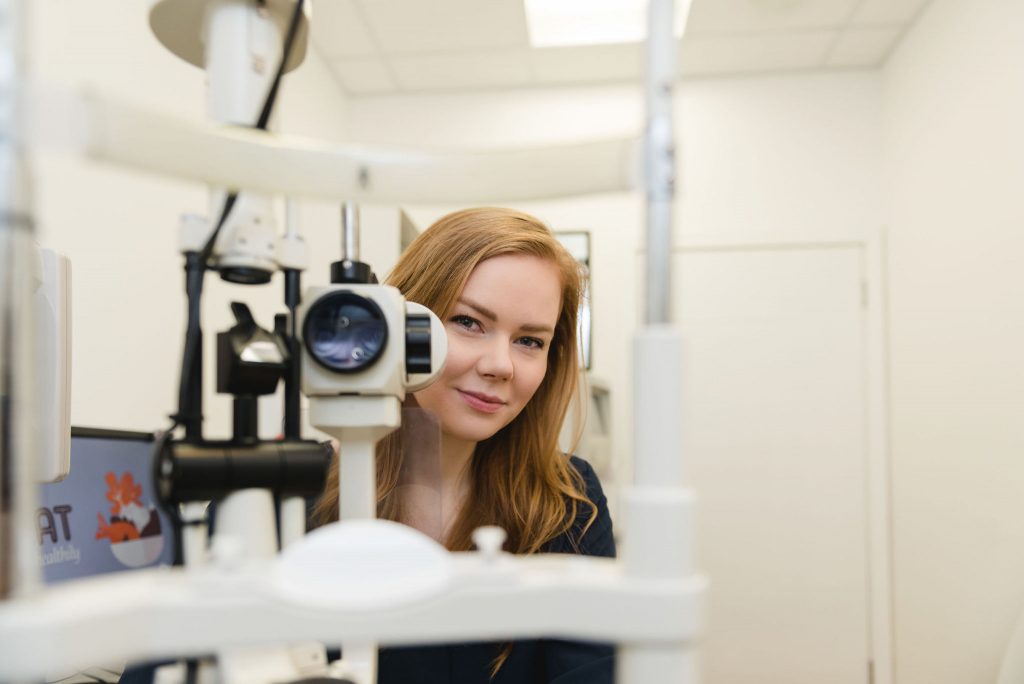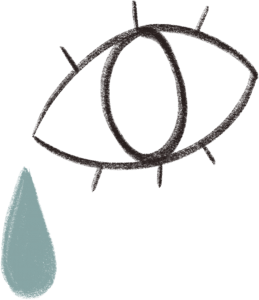
For all the stages in life, we can be there
We pride ourselves on looking after the eye health of every generation. From a child’s first ever eye test to monitoring of their vision throughout school. We can help cater for your visual needs during your working life and help you protect your vision for the future.

NHS Eyetests
In Scotland, eye examinations are paid for by the NHS. This means that everyone living in Scotland is entitled to a full eye exam at least every two years, and a supplementary eye exam if you are having any problems with your eyes or your vision.
BookCommon concerns
Changes in vision, headaches, eye strain and eye pain are all common concerns that should be discussed with your optometrist. We can help diagnose and treat most eye problems, and help direct you to the best health care professional if there are any underlying issues or further treatment required.
Dry eyes
Dry eye occurs when your eyes don’t make enough tears, or your tears evaporate too quickly. Dry eyes can feel scratchy, irritated, watery, and may even make your vision intermittently blurry. There are many treatments available, but the right one depends on the cause and nature of your dry eyes.
We offer dry eye advice and management as part of any routine or supplementary NHS eye examination and have a great range of dry eye treatments available to purchase.
If over-the-counter drops or standard NHS treatments haven’t provided the relief you need, we have a Private Dry Eye Clinic available. Initial consultations are £100 and include full clinical investigation, a lifestyle evaluation report, an at-home treatment package, a deep lid clean (BlephEx®) and lacrimal syringing where appropriate. Follow-up appointments are £50 each.
Treating patients with dry eye is one of Gemma’s specialities and an area in which she has further studied as well as teaching other optometrists. As Gemma is a qualified Independent Prescribing Optometrist, she is also able to prescribe a wide range of dry eye treatments.

Cataracts
Cataracts form when the clear lens inside your eye becomes cloudy or misty. This is a gradual process that usually occurs as we get older, but can sometimes occur earlier in life for those with certain medical conditions or taking certain medications.
Cataracts can cause your vision to become more blurred, and can cause glare when looking at car headlights, street lamps, or bright sunlight. Sometimes, a simple change in prescription and a tint or anti-reflection coating can help.
When necessary, we can advise when cataract surgery may be required to gain the best vision. This can be done through the NHS, or privately. We have an excellent relationship with Eye Care Scotland based at BMI Ross Hall, and will be happy to discuss all available options with you.

Diabetes
Diabetes can have many effects on the eye, including sudden changes in prescription, early cataract formation and small bleeds and inflammation inside the eye.
Patients with diabetes should have an eye examination every year and should also be attending a yearly retinopathy screening (organised through your GP). At our clinic we use the same OCT retinal scanner used in the hospital eye service to monitor diabetic changes in the eye. In some cases, we are even able to diagnose diabetic changes in patients that do not yet know they have the disease.

Age-Related Macula Degeneration (ARMD)
The macula is an area at the back of your eye that is responsible for your central vision, most of your colour vision and making out fine detail. When the macula degenerates, it becomes harder to recognise faces, or to read or watch television. However, the edge of your vision (peripheral vision) is not normally affected.
ARMD can be ‘wet’ or ‘dry’. Dry ARMD is when yellow deposits, known as drusen, build up behind the macula. There is no treatment for dry ARMD but it should be monitored.
Wet ARMD develops when abnormal blood vessels grow under the macula and leak blood or fluid, leading to scarring and rapid loss of central vision. Wet ARMD can develop very suddenly but it can now be treated if caught quickly. Fast referral to a hospital specialist is essential.
At Hill Eyecare, we are able to use an OCT scanner to produce a high quality scan of your macula. This allows us to pick up the very earliest signs of macula degeneration, sometimes before any symptoms have developed. In these cases, we can advise you of the right lifestyle and diet changes to make to help protect your macula as much as possible.

Glaucoma
Glaucoma is a group of eye diseases in which the optic nerve is damaged. It can affect one or both of your eyes and can lead to sight loss if not treated. The two most common types of glaucoma are chronic glaucoma, which develops slowly, and acute glaucoma, which causes the pressure inside your eye to increase rapidly.
Most people with glaucoma are not aware of any symptoms until the disease is in its final stages. It is most commonly found as part of your routine eye examination, in which your optometrist will monitor small changes in your eye health that indicate glaucoma may be present.
At Hill Eyecare, we are able to use an OCT scanner to produce a high quality scan of your optic nerve. This allows us to pick up the very earliest signs of any damage to the nerve. Patients who show these signs of damage, or those with a higher risk of developing glaucoma, will often be seen by us more frequently so that any necessary referral to a glaucoma specialist can be made as soon as possible.

Children’s eyecare
At Hill Eyecare, testing children’s eyes is one of our favourite services. We benefit from testing many members of the same family, and take pride in the ability to care for children’s eye health from nursery age all through their school and university years.
Being able to see clearly is incredibly important for a child’s overall development. Children are unlikely to realise they have poor vision, therefore routine testing throughout childhood is key.
Emergency eyecare
In Scotland, all problems with your eyes or your vision should be seen by your optometrist. This allows you to be seen at a convenient time and place, and avoids the need for you to wait in A&E or a GP reception. It also ensures that you are assessed by someone with the right equipment and knowledge of eye problems.
Contact usWhat we can do in an emergency
Two of our resident optometrists, Gemma and Jenny, are qualified Independent Prescribing Optometrists. This allows them to prescribe all drugs relevant to the eye. In most cases, this can avoid the need for trips to the hospital or your GP, allowing problems to be dealt with quicker and more conveniently for you.
In some cases, issues with your eyes are deemed an emergency and we may insist that you attend our clinic that day. If your eye becomes suddenly red, painful, or sensitive to light, or if you experience flashing lights, new floaters across your vision, or have a sudden decrease in your vision, please call us straight away. One of our trained members of staff will then assess how soon you will need to see an optometrist.

Red eyes & emergency care
If you suddenly develop any of the following symptoms please call us straight away. One of our trained staff will triage you to assess how soon you need to be seen by an optometrist:
- A loss of vision in one or both eyes
- A red eye
- A painful eye
- An eye that is sensitive to light
- An eye that has suffered from a minor injury
- Flashes of light in your vision
- New floaters in your vision

